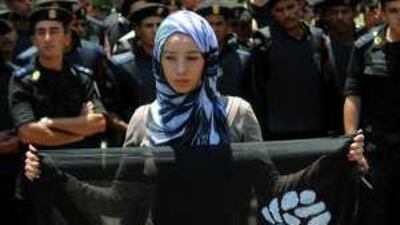CAIRO // Anti-riot police clashed with demonstrators yesterday as they prepared to march towards parliament demanding economic reforms and an end to Egypt's decades-old emergency law. About 400 demonstrators, including several members of parliament and opposition leaders, gathered in Cairo's main Tahrir Square demanding political reform despite a ban and warnings from the interior ministry.
However, hundreds of anti-riot and plain-clothed police surrounded the group and began to hit the protesters with batons. One activist, named as Ahmed Douma by fellow demonstrators, was arrested. Gamila Ismail, a member of the group Egyptian Women for Change, said: "When we tried to break the police barricades and go with the march as planned, the police pushed and hit us." The legislators, mainly from the Muslim Brotherhood, Egypt's strongest opposition group, had called for yesterday's protest to demand the end of emergency law, which has been imposed since 1981, and is expected to be renewed this month.
The law was put into effect when Hosni Mubarak, the Egyptian president, came to power after his predecessor Anwar Sadat was shot dead by Islamist militants at a military parade on October 6, 1981. Hassan Nafaa, the co-ordinator of the Egyptian Association for Change, said before the clashes: "This protest includes all the Egyptian symbols across the political spectrum, who gathered here to say, in a very simple, calm and civilised way, that Egypt stands united against emergency laws which prevent holding fair and free elections."
The demonstrators called for new laws to expand political rights and constitutional amendments to ensure free and fair elections. They also chanted against Mr Mubarak and his ruling National Democratic Party. "In the name of seven million unemployed Egyptians, Mubarak is null and void" and "Egyptian people are on the pavement, they can't been afford a loaf of bread", were rallying cries at the protest.
Opposition leaders want emergency laws abolished and constitutional amendments before this year's legislative elections and next year's presidential elections. Speeches calling for reform were made by a number of leaders at the protest including, Hamdi Hassan, spokesman for the Brotherhood bloc in parliament, Hamdeen Sabahi, a politician with the leftist el-Karama party and Yehia el-Gamal, a renowned judicial figure.
Mr Mubarak, who turns 82 today, has not said if he will run in the presidential elections. He has been recuperating at the Red Sea resort of Sharm el Sheikh for more than a month after having his gallbladder removed in March. @Email:nmagd@thenational.ae

